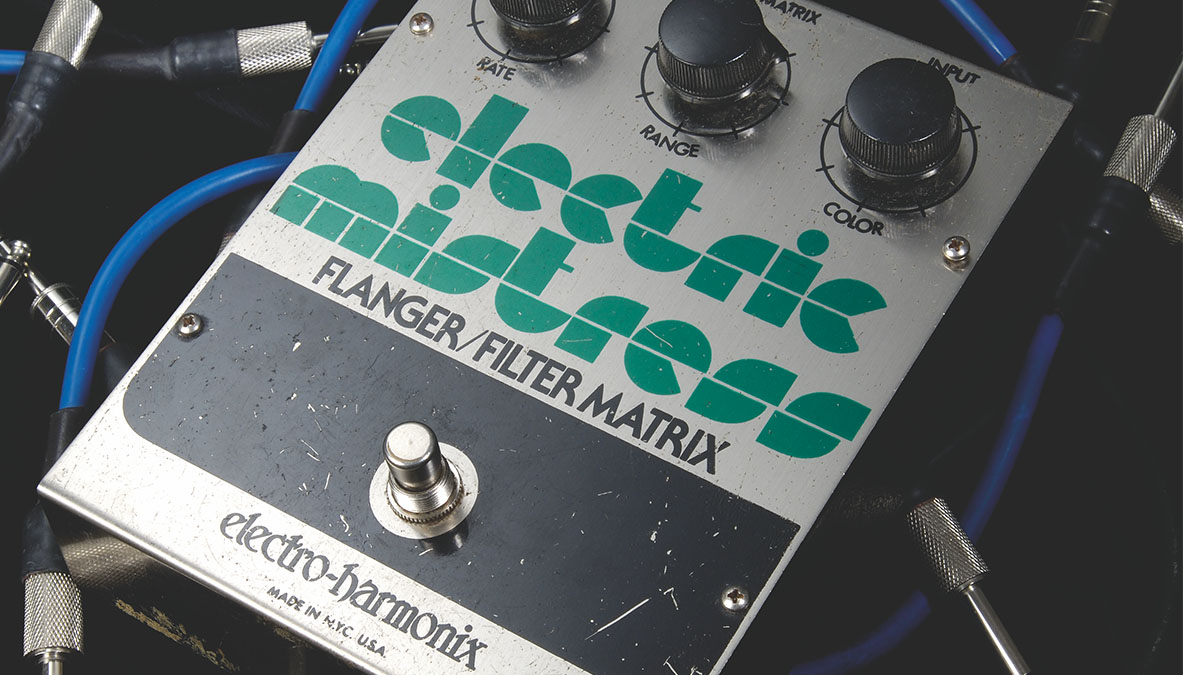
The emergence of bucket-brigade device (BBD) integrated circuits like the Panasonic/Matsushita MN3001 in late 1974 and the Philips TDA1022 and Reticon SAD1024 in late 1975 kicked off the music industry’s equivalent of the Space Race.
These ICs enabled the creation of a wide variety of cool effects, including analog delay, chorus and flanger pedals, which numerous manufacturers rushed to develop. The first flangers to hit the market were studio rackmount products – the Eventide FL201 Instant Flanger and MXR M-111 Auto Flanger – followed shortly afterwards by the first (relatively) affordable stompbox flangers.
Was the Electro-Harmonix Electric Mistress the first flanger pedal? Possibly. It was certainly one of the first, as confirmed by ads for the Electric Mistress, MXR Flanger and Tycobrahe Pedalflanger that appeared concurrently in Guitar Player magazine in late 1976. (Another contender is the rare Seamoon Studio Flanger – the A/DA Flanger’s predecessor – which appeared around this time as well.)
Whether the Electric Mistress was first or not is a moot detail; what’s important is that it sounded great and has remained popular for nearly five decades.
One alluring characteristic of the Electric Mistress is how it generates traditional sweeping flanging and lush chorus effects equally well.
In basic terms, flanging and chorus are similar effects where a dry signal is mixed with a delayed signal processed by a low-frequency oscillator (LFO) that varies the delay time, the main difference being flanging occurs with delay times between 0.7 to around 10ms, while the sweet spot for chorus is generally between 10 to about 30ms or more, with some crossover of the two between 5 to 10ms.
The Electric Mistress notably doesn’t have a Manual (variable center delay time) control, so apparently its delay time is set at a fixed center that, at my best guess, is around 5 to 10ms.
Another factor in the Electric Mistress’ distinctive sound is its Range control, which adjusts the width of the modulation by lowering the frequency range while maintaining consistent upper frequencies. This gives the effect much of its distinctive treble shimmer and bite.
The Filter Matrix switch, which stops the LFO and “freezes” the flanging effect’s frequency cancellations in mid-sweep, creates unusual metallic tones that can be “tuned” with the Range knob. The Rate knob covers a wide range from slow sweeps to vibrato-style fast warbles, and the Color knob dials in the intensity of the effect (a.k.a. feedback, regeneration, resonance, etc.).
David Gilmour and Andy Summers are the most well-known users of the original (i.e. pre-Deluxe version) Electric Mistress pedal. Gilmour used his mainly for slow sweeping flange effects on his solo and Pink Floyd albums during the late ’70s and early ’80s, while Summers dialed in a variety of effects from slow sweeps (Bring On the Night) to shimmering chorus (Walking On the Moon).
Electro-Harmonix’s recent rebranding of the Deluxe Electric Mistress as the Andy Summers Walking On the Moon pedal should be the final definitive proof that he used a flanger and not a chorus pedal on that song, although that still won’t stop online forum charlatans from claiming otherwise.
Other notable users include Alex Lifeson (Rush’s Spirit of the Radio and Red Barchetta solo), Robin Trower (In City Dreams), Dimebag Darrell (Pantera’s Great Southern Trendkill), Billy Corgan (Smashing Pumpkins’ Gish and Siamese Dream), James “Munky” Shaffer (Korn’s No Place to Hide), Keith Levene (PiL’s Public Image), Travis Stever (Coheed and Cambria) and John Ashton (Psychedelic Furs).







